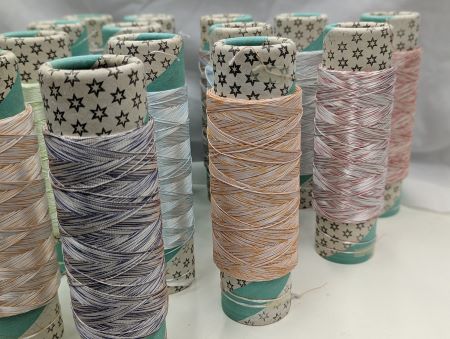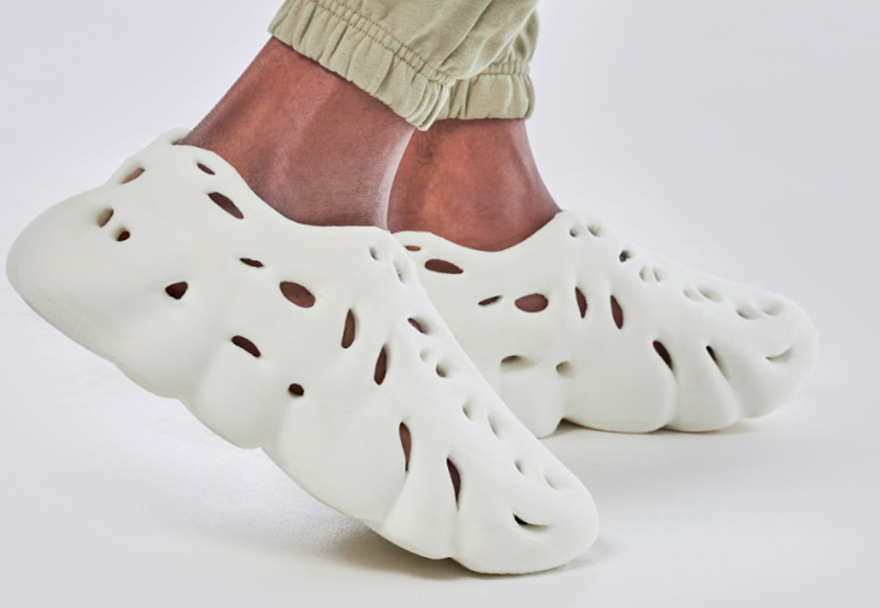Sensor yarns for health monitoring
November 27th, 2023
Researchers at DITF believe sensor yarns will be significant in many applications including for chronic wound care and vital sign monitoring. Photo: DITF. Smart textiles have so much possibility in the medical field, including wound healing and vital signs monitoring. Sensor yarns are a part of this future, as discussed by representatives of the German […]
Startups introduce 3D printed shoes
July 17th, 2023
UAE-based 3D printed footwear startup ELASTIUM has introduced its first 3D printed sneakers made from 100 percent recyclable foam. The sneakers incorporate a novel lattice-structured low-density thermoplastic elastomer (TPE) foam material. This foam is manufactured using ELASTIUM’s proprietary granulate extrusion 3D printing technology. The sneakers prioritize both comfort and resilience, with a softness similar to Crocs and a cushioning […]
Protective textiles at work
July 11th, 2022
A safe, clean and pollution free workplace is important in offering quality of life for a labor force, which also enhances worker productivity. With multiple risk factors in a work environment, including mechanical or electrical hazards, extreme heat or cold, toxic chemicals, noise and air pollution, providing for worker physical and psychological comfort is a […]
Central National Gottesman (CNG) Expands into Nonwovens & Fibers, Growing Its Global Product Category Offerings
October 23rd, 2020
Central National Gottesman Inc. (CNG), which owns sales and distribution businesses in the global pulp, paper, tissue, packaging, wood products and metals industries, has announced that its Central National division will expand its product offering to include nonwovens and fibers. The new category includes viscose and lyocell, the plant-based fibers used in textiles, nonwovens and […]
Hologenix announces collaboration with Designtex
March 19th, 2020
Hologenix LLC has announced a collaboration with Designtex to launch Designtex Celliant upholstery. Celliant, invented by Hologenix, is a blend of naturally occurring, thermo-reactive minerals that are applied as a nonwoven backing. The minerals capture and convert body heat into infrared energy, which, according to the company, has been clinically shown to increase local circulation […]
The things people come up with!
January 13th, 2020
by Janet Preus That sustainability is a powerful driver for new innovations in textiles is not altogether surprising for those of us who have been observing the industry for several years. What always surprises me, though, is the innovations themselves. The ways researchers and business innovators accomplish new sustainability advances—the research itself, the prototypes, the […]
CORDURA introduces MoveX stretch fabrics
November 19th, 2019
CORDURA brand has introduced MoveX CORDURA NYCO, a range of stretch fabrics from Sapphire Mills. Innovation in Textiles reports that the new fabrics are said to offer specifically engineered enhanced stretch solutions to provide dimensional stability and chemical resistance required for garments subjected to higher-temperature washing. The MoveX range is designed to offer excellent stretch and stretch-recovery properties as well as the […]
Textile from banana fibers wins design prize
November 11th, 2019
Photo: QWSTION. Swiss backpack brand QWSTION has been awarded the Design Prize Switzerland 2019 in the textile category for its textile “Bananatex.” The technical textile is made from banana plant fibers known as banana hemp or abaca. The fibers are reported to give the bags strength and durability; a coating of beeswax provides water-resistance. Sustainability is an […]
New study addresses microplastic fibers in effluents
October 14th, 2019
The Hohenstein Institute published a study this month describing a new analytical approach for the determination of fibers in effluents. The detection of shedded fibers in effluents from textile washing has attracted attention due to its reported contribution to microplastic pollution. Commonly used analytical methods for fiber detection in liquids are based on filtration with […]
Printed Electronics World event in November
April 16th, 2019
On Nov. 20 and 21, 2019, end users and suppliers from around the globe will gather for a Printed Electronics World event to explore the technology capability and opportunities of printed, flexible and hybrid electronics. The event will focus on end-user case studies, needs and opportunities; the latest technology and product road maps, capabilities and […]
 TEXTILES.ORG
TEXTILES.ORG





